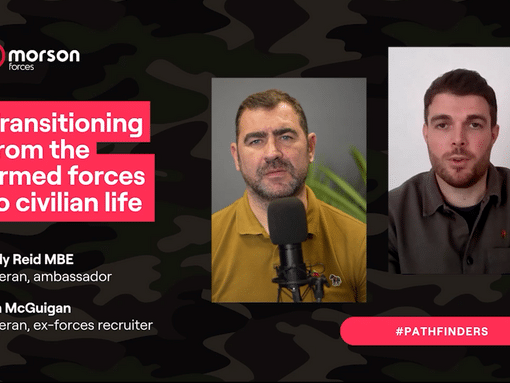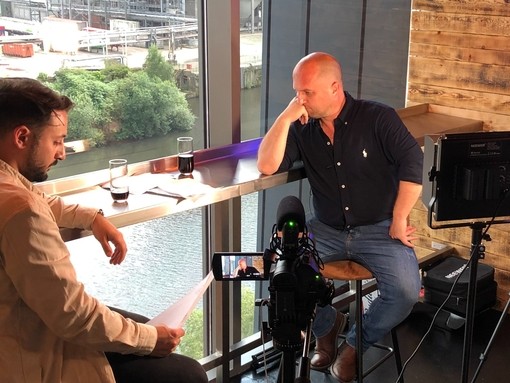
The best tip for writing a cover letter is ‘don’t’. Here’s why.
Contents
- What is a cover letter?
- Who is reading them?
- Haven’t you got something better to be doing?
- They aren’t as personal as you think (and you won’t stand out)
- You could make a mistake
- You aren’t helping the tech
- What to do instead of a cover letter
- Create a personal website or portfolio
- Cultivate your LinkedIn profile
Contents
In the fast-paced world of job hunting, writing a cover letter has been considered a crucial component of a job application for as long as we can remember

What is a cover letter?
First and foremost, what is a cover letter? In the digitally dominated world of job searching, it’s entirely possible that a younger generation of candidate might simply be unaware of what a cover letter is.
A cover letter is a formal document that accompanies a job application, typically a CV. It serves as an introduction to the potential employer and provides additional information about your qualifications, experiences, and motivation for applying for a specific job. It’s a one-page chance to highlight your interest in the company you’re applying for and briefly highlight why you are an ideal candidate for the role, offering a summary of the contents of the CV.
Tailored to each application individually, at their best they’re an opportunity for you to explain how your background and career goals align with the organisation’s mission, values, and the specific responsibilities of the job.
However, some recruiters are beginning to think of cover letters as outdated, and possible a waste of your time.
Who is reading them?
One of the most significant drawbacks of cover letters is their questionable effectiveness. Often, they end up unread or skimmed over by recruiters. In a fast-paced job market, hiring managers may prioritise other application materials, such as the actual CV itself or online profiles. This means that your well-crafted cover letter could go unnoticed, rendering your efforts futile.
Different employers have varied expectations regarding cover letters. Some companies may expect a cover letter with every application, while others do not consider them at all. This inconsistency makes it challenging for applicants to determine whether their time and effort spent on a cover letter will be appreciated or ignored.
Haven’t you got something better to be doing?
Writing a well-crafted cover letter is a time-consuming process. It requires careful research about the company, customisation for each application, and proofreading to avoid mistakes. Time spent on a cover letter might be better used networking or refining your CV to showcase your qualifications effectively.
Job seekers often have limited time to apply for positions, especially if they are actively searching for work. In this competitive landscape, your time might be better spent researching job listings, networking, improving your interview skills, or expanding your skill set. Skipping the cover letter can free up time for these activities that are more likely to yield positive results.
They aren’t as personal as you think (and you won’t stand out)
Despite being touted as a personalised introduction to a potential employer, cover letters often come across as generic and uninspired. Applicants often use templates or general formats, which make their cover letters feel detached and repetitive. This lack of personalisation can diminish the impact of your application and just serve as an unnecessary piece of paper to navigate.
Plus, the information contained in a cover letter is often just a repeat of the details found in your CV. Recruiters will still need to review your CV to understand your qualifications, work history, and education. Most cover letters merely add an extra layer of repetition without offering substantial new insights into your candidacy, and no amount of trying to make yourself sound interesting will change that.
You could make a mistake
Writing a cover letter increases the risk of making errors that could cost you a job opportunity. Typos, grammatical mistakes, or inappropriate content in your letter can damage your chances of being considered for the position. In contrast, a CV is a more straightforward document, focusing on facts and qualifications.
Many people will spend time researching a company to try and weave their own personality with the businesses culture, goals and values. Often that comes across as too convenient, too obvious and won’t impress a hiring manager as much as you might think it does.
You aren’t helping the tech
In today’s digital age, many companies use applicant tracking systems (ATS) to manage job applications. These systems are primarily designed to scan and analyse CVs, not cover letters. By focusing on your CV, you increase your chances of getting through these initial screening processes, which can be critical for your application’s success.
The addition of a cover letter will not strengthen your application through an ATS. So why waste the time on writing one?
What to do instead of a cover letter
Some job seekers have found success by using alternative methods to stand out in the application process.
Create a personal website or portfolio
If possible or suitable, consider creating a personal website or portfolio that contains examples of your work. This can be linked through on a CV and provide a talking point for that job interview down the road.
Cultivate your LinkedIn profile
LinkedIn profiles can provide a more interactive and engaging way to showcase your skills and qualifications. They can also be used to show that personal side of yourself outside of the professional. Spend more time cultivating your profile, offering comments or thought leadership style pieces to your network – you’ll find a lot more value in that than a cover letter.
While the cover letter has long been a standard part of job applications, there are compelling reasons to reconsider its role. From its questionable effectiveness and time-consuming nature to the redundancy with CVs, writing cover letters might not be the best use of your job search time and effort. Job seekers should carefully assess the expectations of the positions they are applying for and consider alternative methods for presenting their qualifications. By doing so, they can make more efficient and effective use of their job search efforts.
Now that the question of whether to include a cover letter or not is out of the way, how about optimising your CV for your job search?
Or if you’re ready to go, search our latest live roles here
Contents
- What is a cover letter?
- Who is reading them?
- Haven’t you got something better to be doing?
- They aren’t as personal as you think (and you won’t stand out)
- You could make a mistake
- You aren’t helping the tech
- What to do instead of a cover letter
- Create a personal website or portfolio
- Cultivate your LinkedIn profile
















